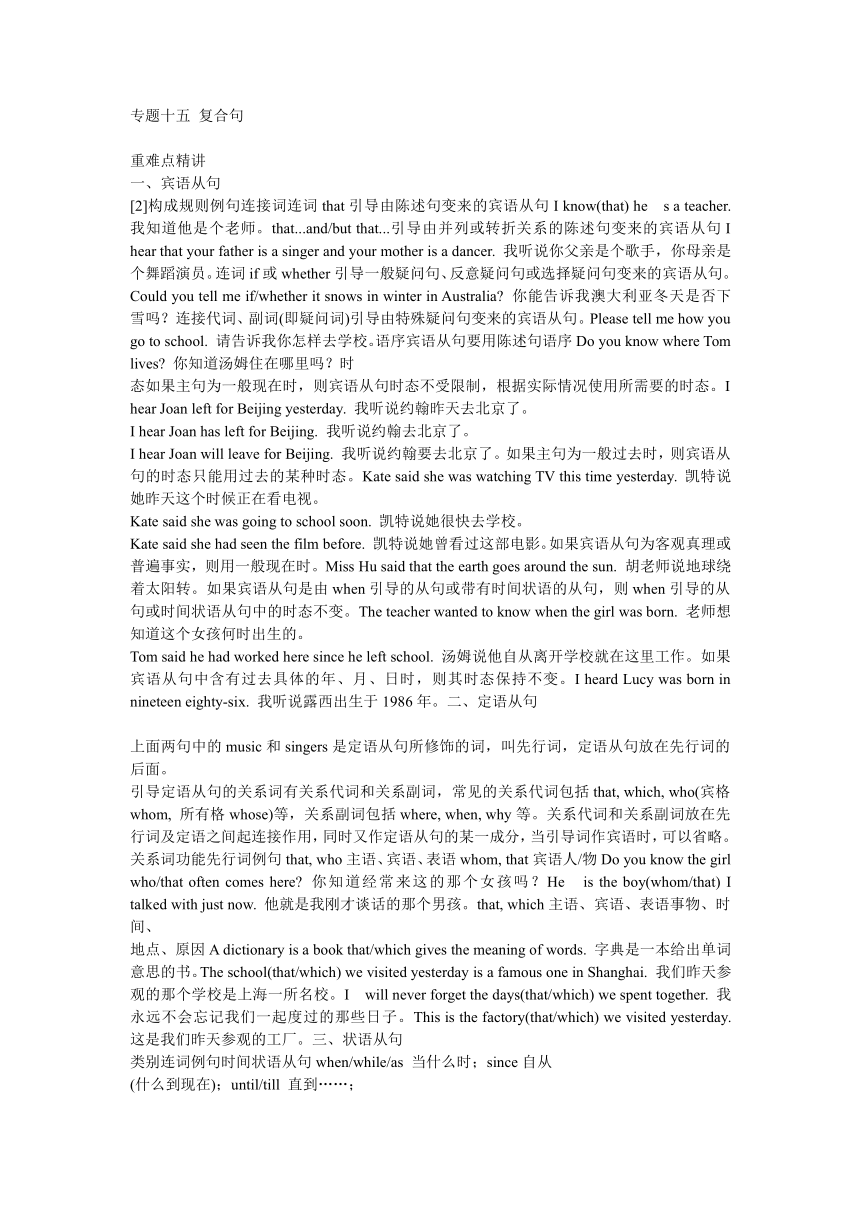【重难点精讲】河北省2014届中考英语外研考点解密:第二部分 语法专题突破 专题十五 复合句
文档属性
| 名称 | 【重难点精讲】河北省2014届中考英语外研考点解密:第二部分 语法专题突破 专题十五 复合句 |

|
|
| 格式 | zip | ||
| 文件大小 | 6.7KB | ||
| 资源类型 | 教案 | ||
| 版本资源 | 外研版 | ||
| 科目 | 英语 | ||
| 更新时间 | 2014-06-03 00:00:00 | ||
图片预览

文档简介
专题十五 复合句
重难点精讲
一、宾语从句
[2]构成规则例句连接词连词that引导由陈述句变来的宾语从句I know(that) he?s a teacher. 我知道他是个老师。that...and/but that...引导由并列或转折关系的陈述句变来的宾语从句I hear that your father is a singer and your mother is a dancer. 我听说你父亲是个歌手,你母亲是个舞蹈演员。连词if或whether引导一般疑问句、反意疑问句或选择疑问句变来的宾语从句。Could you tell me if/whether it snows in winter in Australia 你能告诉我澳大利亚冬天是否下雪吗?连接代词、副词(即疑问词)引导由特殊疑问句变来的宾语从句。Please tell me how you go to school. 请告诉我你怎样去学校。语序宾语从句要用陈述句语序Do you know where Tom lives 你知道汤姆住在哪里吗?时
态如果主句为一般现在时,则宾语从句时态不受限制,根据实际情况使用所需要的时态。I hear Joan left for Beijing yesterday. 我听说约翰昨天去北京了。
I hear Joan has left for Beijing. 我听说约翰去北京了。
I hear Joan will leave for Beijing. 我听说约翰要去北京了。如果主句为一般过去时,则宾语从句的时态只能用过去的某种时态。Kate said she was watching TV this time yesterday. 凯特说她昨天这个时候正在看电视。
Kate said she was going to school soon. 凯特说她很快去学校。
Kate said she had seen the film before. 凯特说她曾看过这部电影。如果宾语从句为客观真理或普遍事实,则用一般现在时。Miss Hu said that the earth goes around the sun. 胡老师说地球绕着太阳转。如果宾语从句是由when引导的从句或带有时间状语的从句,则when引导的从句或时间状语从句中的时态不变。The teacher wanted to know when the girl was born. 老师想知道这个女孩何时出生的。
Tom said he had worked here since he left school. 汤姆说他自从离开学校就在这里工作。如果宾语从句中含有过去具体的年、月、日时,则其时态保持不变。I heard Lucy was born in nineteen eighty-six. 我听说露西出生于1986年。二、定语从句
上面两句中的music和singers是定语从句所修饰的词,叫先行词,定语从句放在先行词的后面。
引导定语从句的关系词有关系代词和关系副词,常见的关系代词包括that, which, who(宾格whom, 所有格whose)等,关系副词包括where, when, why等。关系代词和关系副词放在先行词及定语之间起连接作用,同时又作定语从句的某一成分,当引导词作宾语时,可以省略。关系词功能先行词例句that, who主语、宾语、表语whom, that宾语人/物Do you know the girl who/that often comes here 你知道经常来这的那个女孩吗?He?is the boy(whom/that) I talked with just now. 他就是我刚才谈话的那个男孩。that, which主语、宾语、表语事物、时间、
地点、原因A dictionary is a book that/which gives the meaning of words. 字典是一本给出单词意思的书。The school(that/which) we visited yesterday is a famous one in Shanghai. 我们昨天参观的那个学校是上海一所名校。I?will never forget the days(that/which) we spent together. 我永远不会忘记我们一起度过的那些日子。This is the factory(that/which) we visited yesterday. 这是我们昨天参观的工厂。三、状语从句
类别连词例句时间状语从句when/while/as 当什么时;since自从
(什么到现在);until/till 直到……;
as soon as 一什么就什么I was doing my homework when he came. 他来时我正在做家庭作业。条件状语从句if如果We?will go to see you if we are free. 我们如果有空就去看你。原因状语从句because因为;since既然; as由于Since everyone is here, let?us begin the meeting. 既然大家都在这儿,那我们就开会吧。目的状语从句so that以便,为了Please speak slowly so that we can follow you. 说慢点,那样我们就能跟上你。结果状语从句so that结果是;
so/such...that...
如此什么以至于什么We got up so late that we missed the early bus. 我们起得太晚了以致错过了早班车。让步状语从句although/though尽管The air is around us, though we can?not see it. 即使我们看不见它,空气也环绕着我们。比较状语从句than比; as...as...和什么一样;
not so/as...as...不如什么It was much better than I?had expected. 这比我期望的好多了。方式状语从句as像,如We did as the teacher told us to. 我们照老师说的做。地点状语从句where 哪里Where there is a will, there is a way. 有志者,事竟成。注意: 英语中有些时间和条件状语从句必须遵循“主将从现”原则,即主句为一般将来时态时,它所引导的状语从句使用一般现在时表达将来的意味,这时主句和从句所表达的时态在意义上仍然保持一致。
常见的应使用“主将从现”原则的连词有:表示时间的when, while, after, before, until, till, whenever, as soon as, as long as, once 等;表示条件的if, unless, so long as, in case等。
重难点精讲
一、宾语从句
[2]构成规则例句连接词连词that引导由陈述句变来的宾语从句I know(that) he?s a teacher. 我知道他是个老师。that...and/but that...引导由并列或转折关系的陈述句变来的宾语从句I hear that your father is a singer and your mother is a dancer. 我听说你父亲是个歌手,你母亲是个舞蹈演员。连词if或whether引导一般疑问句、反意疑问句或选择疑问句变来的宾语从句。Could you tell me if/whether it snows in winter in Australia 你能告诉我澳大利亚冬天是否下雪吗?连接代词、副词(即疑问词)引导由特殊疑问句变来的宾语从句。Please tell me how you go to school. 请告诉我你怎样去学校。语序宾语从句要用陈述句语序Do you know where Tom lives 你知道汤姆住在哪里吗?时
态如果主句为一般现在时,则宾语从句时态不受限制,根据实际情况使用所需要的时态。I hear Joan left for Beijing yesterday. 我听说约翰昨天去北京了。
I hear Joan has left for Beijing. 我听说约翰去北京了。
I hear Joan will leave for Beijing. 我听说约翰要去北京了。如果主句为一般过去时,则宾语从句的时态只能用过去的某种时态。Kate said she was watching TV this time yesterday. 凯特说她昨天这个时候正在看电视。
Kate said she was going to school soon. 凯特说她很快去学校。
Kate said she had seen the film before. 凯特说她曾看过这部电影。如果宾语从句为客观真理或普遍事实,则用一般现在时。Miss Hu said that the earth goes around the sun. 胡老师说地球绕着太阳转。如果宾语从句是由when引导的从句或带有时间状语的从句,则when引导的从句或时间状语从句中的时态不变。The teacher wanted to know when the girl was born. 老师想知道这个女孩何时出生的。
Tom said he had worked here since he left school. 汤姆说他自从离开学校就在这里工作。如果宾语从句中含有过去具体的年、月、日时,则其时态保持不变。I heard Lucy was born in nineteen eighty-six. 我听说露西出生于1986年。二、定语从句
上面两句中的music和singers是定语从句所修饰的词,叫先行词,定语从句放在先行词的后面。
引导定语从句的关系词有关系代词和关系副词,常见的关系代词包括that, which, who(宾格whom, 所有格whose)等,关系副词包括where, when, why等。关系代词和关系副词放在先行词及定语之间起连接作用,同时又作定语从句的某一成分,当引导词作宾语时,可以省略。关系词功能先行词例句that, who主语、宾语、表语whom, that宾语人/物Do you know the girl who/that often comes here 你知道经常来这的那个女孩吗?He?is the boy(whom/that) I talked with just now. 他就是我刚才谈话的那个男孩。that, which主语、宾语、表语事物、时间、
地点、原因A dictionary is a book that/which gives the meaning of words. 字典是一本给出单词意思的书。The school(that/which) we visited yesterday is a famous one in Shanghai. 我们昨天参观的那个学校是上海一所名校。I?will never forget the days(that/which) we spent together. 我永远不会忘记我们一起度过的那些日子。This is the factory(that/which) we visited yesterday. 这是我们昨天参观的工厂。三、状语从句
类别连词例句时间状语从句when/while/as 当什么时;since自从
(什么到现在);until/till 直到……;
as soon as 一什么就什么I was doing my homework when he came. 他来时我正在做家庭作业。条件状语从句if如果We?will go to see you if we are free. 我们如果有空就去看你。原因状语从句because因为;since既然; as由于Since everyone is here, let?us begin the meeting. 既然大家都在这儿,那我们就开会吧。目的状语从句so that以便,为了Please speak slowly so that we can follow you. 说慢点,那样我们就能跟上你。结果状语从句so that结果是;
so/such...that...
如此什么以至于什么We got up so late that we missed the early bus. 我们起得太晚了以致错过了早班车。让步状语从句although/though尽管The air is around us, though we can?not see it. 即使我们看不见它,空气也环绕着我们。比较状语从句than比; as...as...和什么一样;
not so/as...as...不如什么It was much better than I?had expected. 这比我期望的好多了。方式状语从句as像,如We did as the teacher told us to. 我们照老师说的做。地点状语从句where 哪里Where there is a will, there is a way. 有志者,事竟成。注意: 英语中有些时间和条件状语从句必须遵循“主将从现”原则,即主句为一般将来时态时,它所引导的状语从句使用一般现在时表达将来的意味,这时主句和从句所表达的时态在意义上仍然保持一致。
常见的应使用“主将从现”原则的连词有:表示时间的when, while, after, before, until, till, whenever, as soon as, as long as, once 等;表示条件的if, unless, so long as, in case等。
同课章节目录
- 词法
- 名词
- 动词和动词短语
- 动词语态
- 动词时态
- 助动词和情态动词
- 非谓语动词
- 冠词
- 代词
- 数词和量词
- 形容词副词及其比较等级
- 介词和介词短语
- 连词和感叹词
- 构词法
- 相似、相近词比较
- 句法
- 陈述句
- 一般疑问句和否定疑问句
- 特殊疑问句及选择疑问句
- 反意疑问句
- 存在句(There be句型)
- 宾语从句
- 定语从句
- 状语从句
- 主谓一致问题
- 简单句
- 并列句
- 复合句
- 主谓一致
- 主、表语从句
- 名词性从句
- 直接引语和间接引语
- 虚拟语气
- 感叹句
- 强调句
- 倒装句
- 祈使句
- 句子的成分
- 句子的分类
- 题型专区
- 单项选择部分
- 易错题
- 完形填空
- 阅读理解
- 词汇练习
- 听说训练
- 句型转换
- 补全对话
- 短文改错
- 翻译
- 书面表达
- 任务型阅读
- 语法填空
- 其他资料
